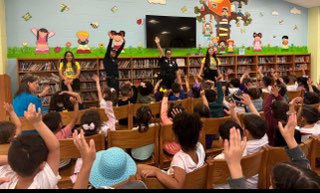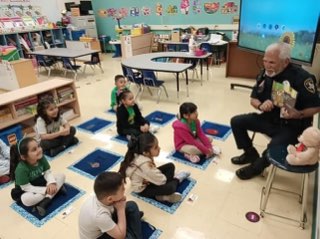Student Safety
Get involved in keeping yourself and your school safe.
Follow the Student Code of Conduct.
Know and follow the school's safety policies.
Follow the school rules.
Confide with an adult (parent, teacher, counselor, etc.) when personally experiencing symptoms of depression.
Listen to the concerns of friends and encourage them to seek appropriate help.
Avoid becoming a victim--- avoid high-risk situations and seek help from adults.
Serve as a big brother/big sister, peer tutor, or mentor for a younger student.
Refrain from teasing, bullying, and harassing other students, and be tolerant of their differences.
Learn ways to resist negative peer pressure.
Speak out and refuse to participate in negative or criminal behavior.

For Safety Preparedness
Actively participate in school safety/violence prevention programs such as conflict management, problems solving teams, peer mediation, and community service.
Serve on the school safety team to provide ideas on how to improve school safety.
Work with teacher and administrators to develop a safe way to report threats.
Learn who to go to with information and concerns about known or potential violence, bullying, and harassment.
Immediately report suspicious behaviors, threats of violence, drug sale or use, bullying and victimization, vandalism, or suicide to school officials or other responsible adults.

For Responding to Crises Situations
In the absence of adult direction, decide where it is safest to be and remain there.
If a violent situation occurs, notify the first available adult.
Follow instructions of school, law enforcement officials or other emergency response personnel.
Assist teachers and staff in determining who is accounted for and who is not.
If able, assist injured persons.
Calm and reassure peers.
For Recovering from a Crisis Situation
Share all related information with law enforcement officials, teachers, and school staff.
Do not speculate or perpetuate rumors.
Seek counseling and other opportunities to deal with stress and grief.
How to keep yourself safe
Things students can do...
Make a commitment not to contribute to violence in any way. Do not bully, tease, or spread negative gossip about others. Respect others and value differences.
Try to broaden your social circle to include others who are different from you.
Learn about ways to resolve arguments and fights without violence and encourage your friends to do the same.
Do not carry a gun. Guns will not make you safer. Guns often lead to conflicts and increase the chances that you will be seriously harmed or that another person will be hurt. Remember it is illegal for a teen to carry a handgun, and it can lead to criminal charges and arrest.
If you find a gun, do not touch it. Get away from it and tell someone. If a friend wants you to touch or hold a gun, say NO.
If you see a crime being committed or hear that someone has brought a weapon to school, tell your teacher, a parent or the police.
If someone is threatening you and you feel that you are in serious danger, do not take matters into your own hands. Contact a school administrator, police, and an adult you can trust. Report all incidents of guns or weapons.
Check first before you go anywhere with anyone. Check with the adult who is in charge of you at the time. If you cannot check, then the answer is NO.
Find a safe way to get to school. Try to stay away from areas where gangs and drug dealers hang out. Know where you can go for help if you need it.
Know your full name, address (including state), telephone number with the area code.
Know your parents' names and telephone numbers.
You are in charge of your body. No one has the right to touch you or talk about your body in a way that is wrong or that makes you feel uncomfortable or afraid. Say NO, and then tell someone.
Stay away from drugs and alcohol. Say NO to bullies, dares, and drugs.
When you are home alone, keep the door(s) locked and closed for everyone. Let the phone ring, use caller ID or the answering machine, or work out a system with your parents so that no one knows that you are home alone.
When you are on the internet, keep personal information to yourself. Ask your parents which sites you can visit.
Be kind and caring. Use non-violent words and actions.
If you are being bullied...
Talk to your parents or an adult you can trust, such as a teacher, school counselor, or principal.
Avoid bringing expensive stuff or lots of money to school. Bullies thrive on picking on people that bring things they can take.
Act confident. A bully will be less likely to single you out if you project self-confidence.
Stand up to the person who is doing the bullying. Be firm and clear. Look at the bully and tell him/her to stop. Just be careful not to bully them back. Do not resort to violence in handling the bully.
Try to make friends with other students. A bully is more likely to leave you alone if you are with friends.
Be careful about who you give your phone number and e-mail address to.
Avoid situations where bullying can happen.
Avoid areas of the school where there are not many students or teachers around.
Make sure you are not alone in the bathroom or locker room.
Avoid being alone with bullies. Walk with friends to and from school, leave at different times, and avoid areas that are isolated or unsupervised by adults.
If riding the bus, sit near the front of the bus.
Keep a record or journal about your experiences with a bully. Writing down what happened will help you get support from your parent, teacher, doctor, or friend.
Participate in activities that you enjoy and where you can make friends who share your interests.
Support someone who is being bullied.
If you see someone being bullied...
Say something. If you feel safe telling the bully to stop, do so.
If not, tell an adult. Talk to an adult you feel comfortable telling such as a parent, teacher, school counselor, principal, nurse, or a friend.
Say kind words to the person who is being bullied. Be understanding.
Tell the person who is being bullied to talk to someone about what happened. Offer to help by going along.
If you are the bully...
Stop it! Think about what you are doing and how it affects others. Put yourself in their shoes.
Think about how it must make them feel, and just don't do it!
Talk to an adult. Parents, teachers, school counselors, or other adults are great to talk to about how to change the way you treat others.
Identity Theft
Identity theft is one of the fastest growing crimes in the nation, and students may be particularly vulnerable to this crime. Learn how to protect yourself and your future from identity theft by going to http://www.ed.gov/misused.
The Office of Inspector General at the U.S. Department of Education is working to raise public awareness-especially among college students-about the fast-growing danger of identity theft. http://www.ed.gov/misused contains information for students and schools about how to prevent identity theft involving federal education funds and how to report this crime.
For more Identity Theft information, visit the Texas Department of Public Safety website.
